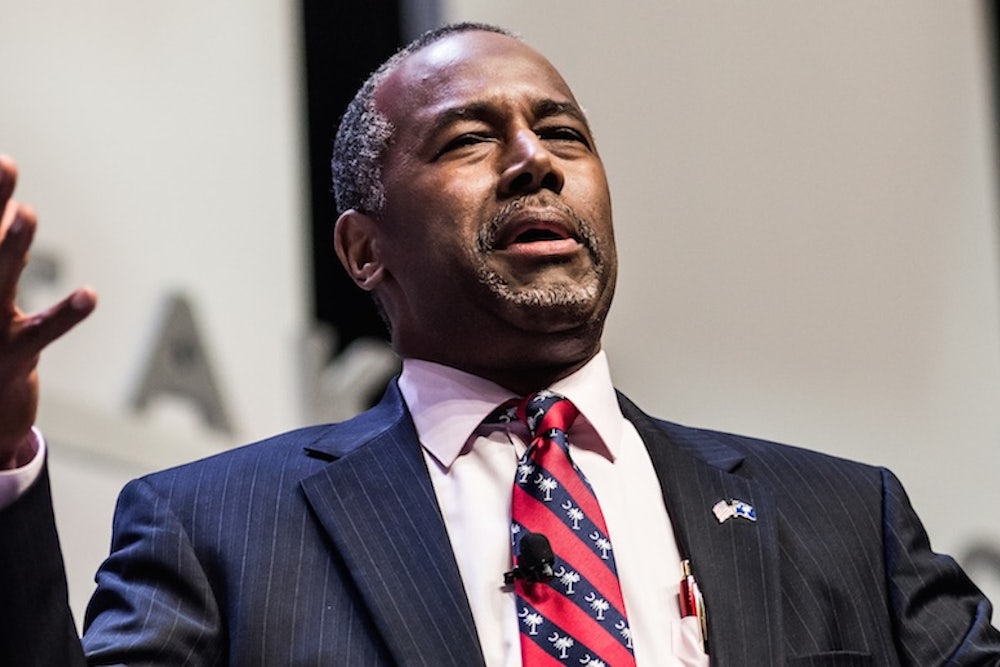Dr. Ben Carson excels in addled interpretations of America’s founding principles. In May, the Republican presidential candidate claimed that the president has the power to ignore the Supreme Court’s gay marriage ruling. And last month, when asked by Meet the Press’ Chuck Todd whether the Bible has “authority” over the Constitution, said, "That is not a simple question." He extended this streak of misinterpretation on Sunday when Todd asked him whether he thought “Islam is consistent with the Constitution.” Carson replied, “No, I don't, I do not,” and then added, “I would not advocate that we put a Muslim in charge of this nation. I absolutely would not agree with that.”
In fact, Islam is neither consistent nor inconsistent with the Constitution; Islam is irrelevant to any discussion of the Constitution or rules of our governance. The same is true of Catholicism, Judaism, Buddhism, and every Protestant sect—even atheism, as the document does not once mention God. There is no religious test, preference, predilection, or, for that matter, even mention of any particular religion in the document itself and, with the exception of one line in the first amendment, in which “Congress shall make no law respecting an establishment of religion, or prohibiting the free exercise thereof,” no mention of religion is made at all.
At the Constitutional Convention in Philadelphia in 1787, other than an opening prayer, which was non-denominational, and one plea by Benjamin Franklin on June 28 to appoint a chaplain to help break what had descended into an acrimonious logjam—a proposal that was ignored—religion was the last thing the delegates were thinking about. The one instance in which religious preference did arise was after the Convention ended, and John Jay, who had not been present but who would later become the Supreme Court’s first chief justice, wanted to restrict participation in government by Catholics. Jay, descended from Huguenots who had been oppressed by the Catholic majority in France, was quickly persuaded to drop his objections.
The larger issue, however, is the tendency of many Americans these days, both in and out of politics but especially conservatives, to evoke the Constitution without having any idea what it says or does not say. Even worse, they use a document whose sole purpose was to guarantee freedoms to attempt to try to limit the freedoms of those with whom they disagree. The Constitution is imperfect, of course, and in practice has been used to validate some terrible injustices—slavery, the deportation of Japanese-Americans, or speech that some found politically offensive. But past sins in no way means that we should condescend to our worst instincts. The Constitution can also be a tool to create a society where any American can grow up to be president, even a former neurosurgeon who seems to have little respect for its spirit.
Which brings us to Carson’s second assertion on Sunday: that no follower of Islam should sit in the White House. The only possible justification he could have for such a sentiment is the belief that followers of Islam are inherently a security risk, because their first loyalty is to … what? The Islamic State, Saudi Arabia, some radical imam? Deportation of Japanese-Americans during World War II was undertaken for the same reason—that they would somehow be more loyal to the emperor than to the United States. It proved tragically and hideously inaccurate. No one fought with more valor than young Japanese-Americans in Italy whose families had been shunted off to concentration camps.
In the end, the argument is about whether the United States is everyone’s country or just certain people’s country. Dr. Carson once again raises the specter that, despite all evidence and jurisprudence to the contrary, America is a “Christian nation.” Those who take this stance seem to do so only on the basis that most, if not all, of the Founders were Christian, somewhat ironic because overwhelmingly they were, at best, lax in their beliefs. And it is no more accurate to say America is “Christian” because it happens to have a Christian majority than it is to say that America is “white” for the same reason.
“[I]n the view of the Constitution, in the eye of the law, there is in this country no superior, dominant, ruling class of citizens,” Supreme Court Justice John Marshall Harlan wrote in his stinging dissent in Plessy v. Ferguson (1896). “There is no caste here. Our Constitution is color-blind and neither knows nor tolerates classes among citizens. In respect of civil rights, all citizens are equal before the law.” This is also true of religion, as everyone in America—and especially its political leaders—should understand by now. If candidates like Carson can’t be bothered to read and understand the 4,500 words that comprise our founding document, they should not be considered fit for the job that requires they defend it.
